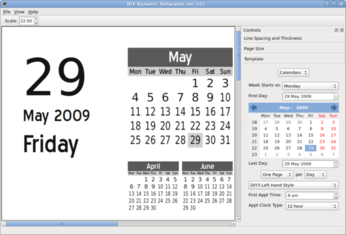Create a DIY Planner with Dynamic Templates

Productivity Sauce
The D*I*Y Planner Web site is a real treasure trove for fans of DIY paper-based personal organizers like Hipster PDA. Among other things, it offers a wealth of ready-to-print templates, an excellent handbook of how to build your own D*I*Y planner, and even an OpenOffice.org-based widget kit for creating custom planner templates. But that's not all. Somewhere on the Web site hides a nifty little application called D*I*Y Planner Dynamic Templates (or just Dynamic Templates) that comes with a few handy templates you can tweak and save as ready-to-use PDF documents. There are binary packages of the application for Windows and Mac OSX, and if you want to use Dynamic Templates on Linux, there is a source code package, too. Compiling the application from the source code is rather straightforward. First of all, install the required Qt tools. On Debian or Ubuntu-based Linux distributions, this can be done by installing the qt4-dev-tools package and all its dependencies. You'll also need to download and install the Blue Highway font that is used in all templates supplied with the Dynamic Templates application. Download then the .tar.gz archive containing the application's source code, and unpack it. In the terminal, switch to the resulting DynamicTemplates directory and run the following commands:
qmake -project qmake DynamicTemplates.pro make
You should then find the compiled DynamicTemplates binary file in the DynamicTemplates directory. Double-click on it to launch the application.
The application's interface is not particularly complicated: the pane to the left displays the currently selected template, while the pane to the right provides quick access to all the available tools. All the tools in the right pane are grouped into sections. The Template section gives you access to the bundled templates and lets you tweak the currently selected template. For example, if you select the Notes template, you can choose between different note types and alignment as well as specify a title. As the name suggests, the Paper Size section lets you choose the desired paper size, and the application supports both US and European sizes. Finally, the Line Spacing and Thickness does exactly what it says: it allows you to tweak the line spacing and line thickness settings. Once you are done tweaking the template, choose File -> Save PDF, print the resulting PDF file, and add the printed page to your swanky paper-based planner. The collection of templates supplied with Dynamic Templates is somewhat limited, but the author promises to add more templates in the upcoming releases of the application.
comments powered by DisqusSubscribe to our Linux Newsletters
Find Linux and Open Source Jobs
Subscribe to our ADMIN Newsletters
Support Our Work
Linux Magazine content is made possible with support from readers like you. Please consider contributing when you’ve found an article to be beneficial.

News
-
The Next Linux Kernel Turns 7.0
Linus Torvalds has announced that after Linux kernel 6.19, we'll finally reach the 7.0 iteration stage.
-
Linux From Scratch Drops SysVinit Support
LFS will no longer support SysVinit.
-
LibreOffice 26.2 Now Available
With new features, improvements, and bug fixes, LibreOffice 26.2 delivers a modern, polished office suite without compromise.
-
Linux Kernel Project Releases Project Continuity Document
What happens to Linux when there's no Linus? It's a question many of us have asked over the years, and it seems it's also on the minds of the Linux kernel project.
-
Mecha Systems Introduces Linux Handheld
Mecha Systems has revealed its Mecha Comet, a new handheld computer powered by – you guessed it – Linux.
-
MX Linux 25.1 Features Dual Init System ISO
The latest release of MX Linux caters to lovers of two different init systems and even offers instructions on how to transition.
-
Photoshop on Linux?
A developer has patched Wine so that it'll run specific versions of Photoshop that depend on Adobe Creative Cloud.
-
Linux Mint 22.3 Now Available with New Tools
Linux Mint 22.3 has been released with a pair of new tools for system admins and some pretty cool new features.
-
New Linux Malware Targets Cloud-Based Linux Installations
VoidLink, a new Linux malware, should be of real concern because of its stealth and customization.
-
Say Goodbye to Middle-Mouse Paste
Both Gnome and Firefox have proposed getting rid of a long-time favorite Linux feature.

